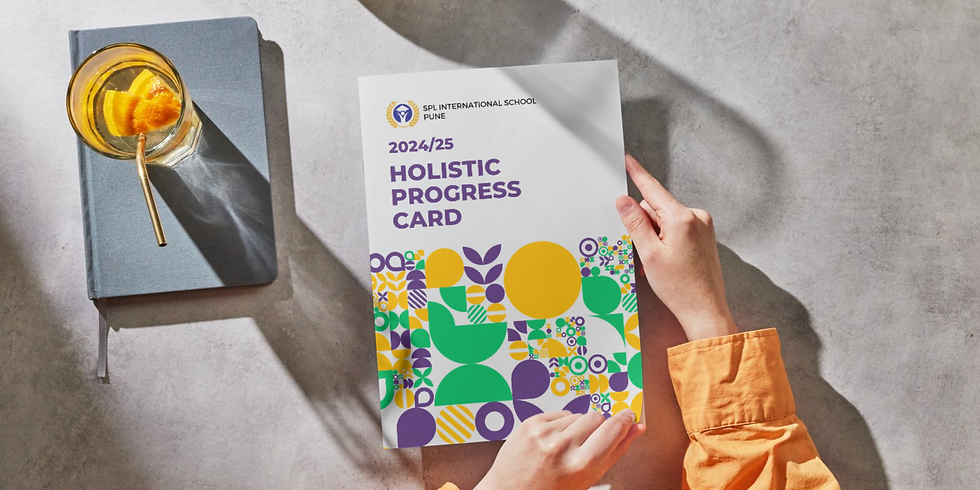The Emergence of Holistic Progress Card
- scratchpad Labs
- Jan 22
- 2 min read

For decades, a report card was the kingpin for schools measuring their success with students. Rows of numbers and percentage scores have influenced ideas about intelligence, potential, and achievement. But in a rapidly changing world, these traditional report cards are beginning to wear thin. Should we define a child's capabilities, creativity, and emotional intelligence by marks alone? Meet Holistic Progress Card —a reimagined student evaluation that accounts for a child's 360-degree potential and academic performance. This change is not just about measurement superiority but building improved people.
What is a Holistic Progress Card?
A holistic progress card goes beyond grades to include assessments of students' academic progress, emotional intelligence, social skills, creativity, and co-curricular activities. It captures a more comprehensive view of a student's growth.
The holistic progress card puts together all aspects of student development:
1) Academic Performance: Grades and subject competence
2) Emotional Intelligence: They can exhibit emotional control, empathy towards others, and effective engagement with peers.
3) Social Skills and Relationships: The student can collaborate, communicate, and resolve conflicts with peers effectively.
4) Creativity and Critical Thinking: The student's ability to think out of the box and solve problems uniquely.
This comprehensive approach ensures no part of a child's growth is overlooked. For example, a child might not be performing well in academics but is performing exceptionally well in leadership, teamwork, or creativity. Holistic progress cards ensure that these strengths are recognized.
Why Traditional Report Cards Fall Short?
Traditional grading systems focus mainly on standardized tests and exams, which can only assess a student's cognitive aspects. However, these measures do not fully represent a student's full potential. The National Education Association conducted a study that shows that students who are assessed holistically show more emotional and academic engagement (NEA, 2020, https://www.nea.org/sites/default/files/2022-06/NEA%20Policy%20Statements%202021-2022.pdf?utm_source).
Traditional report cards do not account for such non-academic strengths. More importantly, traditional grading cannot measure specific vital skills that one must increasingly need today, which include creativity, emotional quotient, and resilience.
This is the child who scores low on traditional exams but is an outstanding leader or a great thinker in real life. All these qualifications are overlooked in traditional report cards.
Parts of a Wholistic Progress Card
A holistic progress card usually contains several elements in addition to grades:
Academic Performance: This is the central element of any progress card but is supplemented by subjective measures such as participation, effort, and improvement over time.
Emotional Intelligence: Teachers grade students on emotional regulation, empathy, and social awareness.
Co-curricular Activities: Students are graded on participating in extracurricular activities such as sports, music, and community service, which develop teamwork and leadership skills.
Behaviour and Attitude: Students' behaviours at school—how they respect other people, show up on time, and assume responsibility—are also considered. This holistic method gives a clearer picture of the student's holistic development.
Stories of Success in Real Life
A new wave of schools around the globe now adopts the holistic progress card model. For instance, the International School of Geneva has incorporated a progressive assessment framework that features social and emotional learning as part of traditional academics; results have been overwhelmingly positive as the students reported increasing levels of self-esteem and improved academic engagement (Smith, 2022). In the United States, a pilot program in Pennsylvania schools has proven that students evaluated using holistic progress cards showed higher improvement rates both in academics and socially than those evaluated through traditional grading systems (Jones & Martin, 2021).
Conclusion
The shift to holistic progress cards is a shift toward a more holistic, well-rounded education. Schooling can make the learning process more supportive and effective by evaluating a student's emotional and social skills for academic performance. As an educator and a school leader, it is time to start thinking about how your school could adopt this balanced approach to evaluation.
If you want to change the assessment system of your school, start by finding out more about holistic progress cards. Book a free consultation today and learn how to implement this system in your school today.




Comentarios